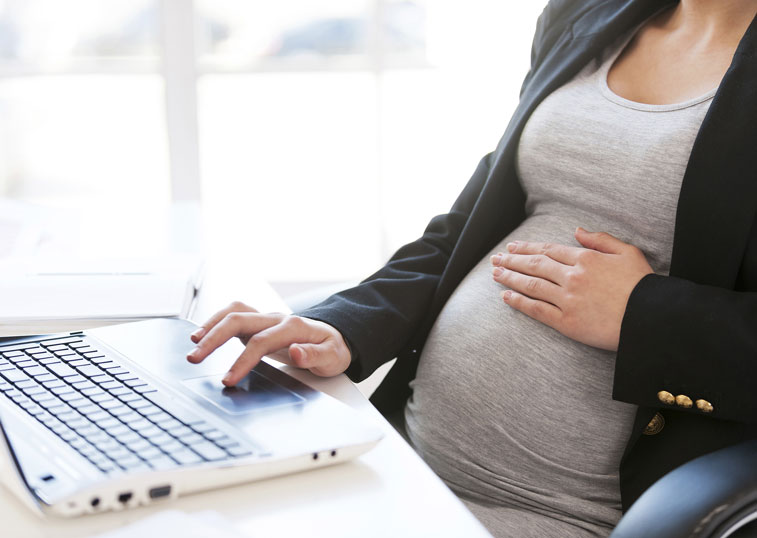You may be asking yourself if working until your due date is healthy for you and your baby.
The main factor to consider is your overall health, which can depend on what you do for a living. In most women, working until your due date is safe for both you and the baby. It can even be beneficial and help keep you active during pregnancy.
Is your pregnancy low-risk?
There are many studies which have concluded that standard working conditions present little to no danger to maternal or child health. A woman with an uncomplicated pregnancy should be allowed to and encouraged to continue working for as long as she chooses. This actually means you can work without interruption until the onset of labor.
Now don’t get us wrong — we are not encouraging you to tough out contractions and risk an in-office birth, although it would make for a unique birth story! All kidding aside, there is no medical reason to quit working early if you and your baby are healthy.
However, there are many conditions that can make your pregnancy high risk. In the event that you develop a complication with your pregnancy, your doctor may recommend modifying your work activities, taking more breaks, or decreasing the amount you work. In some rare instances your doctor may encourage you to stop working all together until the baby is born. This is why it is important to discuss your concerns as well as describing your work environment and responsibilities with your OB.
Can your workplace make accommodations?
Most desk and computer jobs are safe during pregnancy. But because of fluid buildup, some women develop carpal tunnel syndrome. As your body and posture change, back, neck, and shoulder strain may also become an issue.
These tips may help at desk jobs:
- Take frequent breaks.
- Use a pillow or cushion for lower back support.
- Use correct hand and arm positions when using a computer.
- Don’t cross your legs or feet.
Jobs that require standing for long periods can cause back and leg pain. This is especially true late in pregnancy.
Try these tips for standing jobs:
- Prop one foot on a short stool or box to help relieve back pain. A pregnancy support belt may be helpful to relieve back pain.
- Ask if you can sit on a tall stool.
- When taking a break, sit down with your feet up if possible.
- Wear good, comfortable, low-heeled shoes.
- Wear compression socks to help improve blood flow.
If you have a job that requires heavy lifting, pulling, pushing or other physical labor, talk with your provider about whether it is safe to continue.
If you work with chemicals, radiation, heavy metals, gases or biological agents (virus, bacteria, fungus, or parasites) you may need to take extra precautions during pregnancy. Some hazardous agents get into the mother’s blood and can pass to the fetus. Others can affect the mother’s health or harm the fetus directly.
Can you afford early maternity leave?
One other point to consider is maternity leave. In the United States fewer than 40% of women receive any wages during maternity leave.
If you are choosing to start maternity leave before your baby is born, this may limit the precious time you have to spend with your newborn. Also, being off of work for a prolonged period can cause financial strain on a family. It is important you review your work’s maternity leave policy before making these tough decisions about time away from work.
Ultimately, choosing to stop working early is up to you and what is right for your family. Just keep in mind there may not be a medical reason for us to excuse you from work if your pregnancy is normal and healthy. There are also federal laws that protect women from discrimination in the workplace due to pregnancy. If you have concerns about working while you are pregnant please don’t hesitate to address them with your employer and your provider.
Learn more
- What does your due date really mean?
- How to manage stress while pregnant
- 8 warning signs during pregnancy
…
Posted In Pregnancy, Women's, Workplace Health
